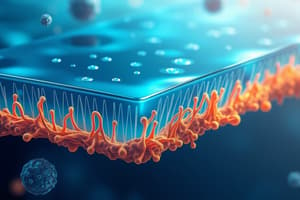Podcast
Questions and Answers
What proportion of the total-body fluid is made up of extracellular fluid?
What proportion of the total-body fluid is made up of extracellular fluid?
- Approximately 1/4
- Approximately 3/4
- Approximately 2/3
- Approximately 1/3 (correct)
Which of the following best describes the relationship between interstitial fluid and plasma in terms of protein concentration?
Which of the following best describes the relationship between interstitial fluid and plasma in terms of protein concentration?
- Plasma contains a much greater concentration of protein compared to interstitial fluid. (correct)
- Interstitial fluid contains a much greater concentration of protein compared to plasma.
- Interstitial fluid and plasma contain roughly equal protein concentrations.
- Neither plasma nor interstitial fluid contains significant amounts of protein.
A researcher is studying the composition of fluid in the human body. If they are analyzing fluid taken directly from inside a cell, which type of fluid are they examining?
A researcher is studying the composition of fluid in the human body. If they are analyzing fluid taken directly from inside a cell, which type of fluid are they examining?
- Intracellular fluid (correct)
- Interstitial fluid
- Extracellular fluid
- Plasma
Considering the distribution of fluids in the body, if the total volume of extracellular fluid is 15 liters, approximately how many liters would be plasma?
Considering the distribution of fluids in the body, if the total volume of extracellular fluid is 15 liters, approximately how many liters would be plasma?
What is the primary distinction between intracellular and extracellular fluid?
What is the primary distinction between intracellular and extracellular fluid?
Which fluid compartment would be the immediate recipient of fluids administered intravenously during emergency resuscitation?
Which fluid compartment would be the immediate recipient of fluids administered intravenously during emergency resuscitation?
If a new medication is designed to only affect the intracellular environment of liver cells, which barrier must it cross to reach its target?
If a new medication is designed to only affect the intracellular environment of liver cells, which barrier must it cross to reach its target?
After donating a pint of blood, which of the following compensatory mechanisms would the body likely initiate first to restore blood volume?
After donating a pint of blood, which of the following compensatory mechanisms would the body likely initiate first to restore blood volume?
A patient is severely dehydrated, leading to a decrease in total-body water. Knowing the compartments of body fluids, which of the following scenarios is most likely?
A patient is severely dehydrated, leading to a decrease in total-body water. Knowing the compartments of body fluids, which of the following scenarios is most likely?
If the barrier separating the intracellular and extracellular fluid compartments were to suddenly become freely permeable to proteins, what immediate change would you expect to observe?
If the barrier separating the intracellular and extracellular fluid compartments were to suddenly become freely permeable to proteins, what immediate change would you expect to observe?
Flashcards
Extracellular Fluid
Extracellular Fluid
Fluid outside of cells, consisting of interstitial fluid and plasma.
Interstitial Fluid
Interstitial Fluid
Fluid between cells within the interstitium, making up 75-80% of extracellular fluid.
Plasma
Plasma
The noncellular (liquid) portion of blood, making up 20–25% of ECF.
Intracellular Fluid
Intracellular Fluid
Signup and view all the flashcards
Internal Environment
Internal Environment
Signup and view all the flashcards
Body Fluid Ratio
Body Fluid Ratio
Signup and view all the flashcards
Fluid Composition Differences
Fluid Composition Differences
Signup and view all the flashcards
Study Notes
- Extracellular fluid consists of interstitial fluid, located between cells in the interstitium, and plasma, the noncellular part of blood.
- Interstitial fluid makes up about 75% to 80% of the extracellular fluid.
- Plasma accounts for approximately 20% to 25% of the extracellular fluid.
- Interstitial fluid and plasma share similar compositions, but plasma has a higher protein concentration.
- Intracellular fluid is the fluid found inside cells.
- The body's internal environment is composed of both intracellular fluid (2/3) and extracellular fluid (1/3), representing the total-body fluid.
- The different compositions in each compartment are due to the barriers separating them.
Studying That Suits You
Use AI to generate personalized quizzes and flashcards to suit your learning preferences.



